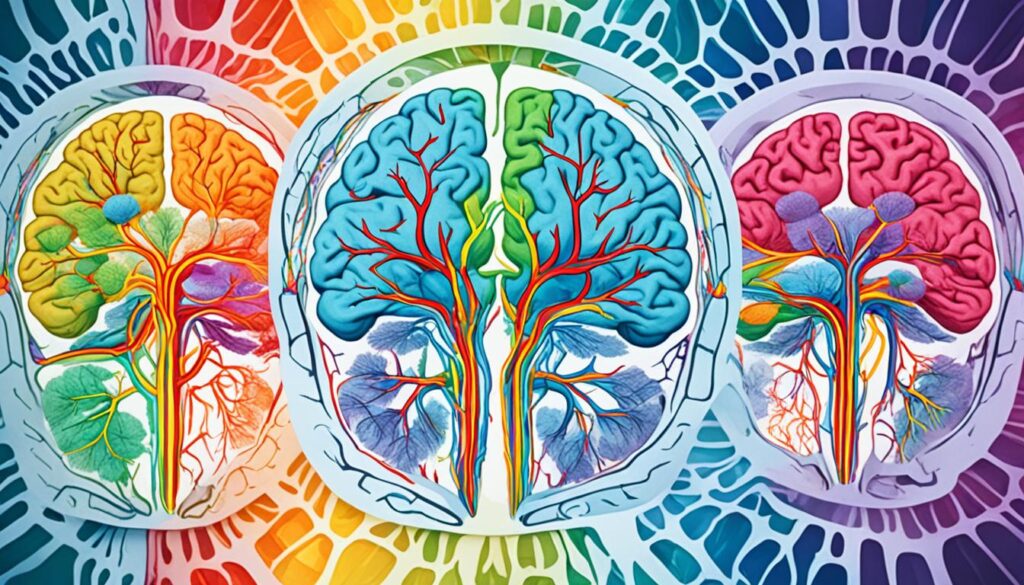Were you aware that more than 80% of Fortune 500 companies utilize personality tests as a component of their recruitment process?
Personality tests have become increasingly popular in recent years, promising to provide insights into our deepest traits and behaviors. But are these test results accurate, or are they just another myth?
In this article, we will explore the factors influencing personality test results, examine the evolution of personality questionnaires, and uncover the limitations of popular assessments like the Myers-Briggs Type Indicator. We will also discuss the need for critical evaluation of personality tests and the role of honesty and self-reflection in obtaining accurate results.
Key Takeaways
- Personality tests are widely used by companies for hiring purposes.
- The accuracy of personality test results is influenced by various factors.
- The popular Myers-Briggs Type Indicator lacks scientific evidence and predictive power.
- Honesty and self-reflection play a crucial role in obtaining accurate personality test results.
- It is important to critically evaluate and consider alternative methods for self-reflection and understanding.
The Evolution of Personality Questionnaires
Personality questionnaires have come a long way since their emergence during World War I. Initially developed for studying personality and mental health problems, these assessments were often based on subjective feelings about personality. However, as research advanced and our understanding of personality deepened, a more comprehensive and scientifically grounded approach was needed.
Enter the Big 5 Personality Traits model, a groundbreaking development in the 20th century. Unlike its predecessors, this model took a more holistic view of personality and avoided subjective criteria. It identified and categorized personality traits into five fundamental dimensions, known as the Big 5:
- Extraversion: Individuals demonstrate outgoing, energetic, and sociable tendencies.
- Conscientiousness: People exhibit traits such as dependability, organization, and self-discipline.
- Agreeableness: Individuals with high agreeableness are cooperative, compassionate, and empathetic.
- Neuroticism: This dimension reflects emotional stability, with low neuroticism indicating resilience to stress.
- Openness to Experience: Individuals who score high on openness are curious, imaginative, and receptive to new experiences.
The Big 5 Personality Traits model revolutionized the field of personality assessment by providing a more comprehensive and scientifically validated framework. It allowed for a deeper understanding of individual differences and served as a foundation for subsequent research in the field.
The Big 5 Personality Traits Model
| Personality Trait | Description |
|---|---|
| Extraversion | Outgoing, energetic, and sociable tendencies |
| Conscientiousness | Dependability, organization, and self-discipline |
| Agreeableness | Cooperative, compassionate, and empathetic |
| Neuroticism | Emotional stability, resilience to stress |
| Openness to Experience | Curiosity, imagination, and receptiveness to new experiences |
With the Big 5 Personality Traits model, personality questionnaires became more reliable and provided a standardized framework for assessing individual differences. Researchers and practitioners alike continue to use this model as a foundation for personality assessment and understanding.
Problems with Commercial Personality Tests
When it comes to commercial personality tests, particularly those aimed at hiring or matchmaking, it’s important to approach them with skepticism. These tests often make grand claims of uncovering hidden truths about individuals, but their reliability and accuracy are questionable at best.
One of the key issues with commercial personality tests is their reliance on correlations that may be incidental and have no scientific basis. Instead of providing reliable insights into individuals’ personalities, these tests often ask odd questions or draw inferences without a solid foundation. Critics argue that these assessments tell people what they want to hear, rather than providing them with accurate information.
Commercial personality tests often rely on pseudoscience and unreliable information, leading to questionable results and outcomes.
To illustrate the problems with commercial personality tests, let’s consider an example:
| Commercial Personality Test | Issue |
|---|---|
| Test A | The questions asked are not scientifically validated and lack reliability. |
| Test B | The test makes broad generalizations without considering individual differences. |
| Test C | There is no empirical evidence supporting the accuracy and effectiveness of the test. |
As you can see, these examples highlight the pseudoscientific nature of some commercial personality tests and the unreliable information they provide.
It is crucial for individuals to be aware of the limitations and potential inaccuracies associated with commercial personality tests. Instead of relying solely on these tests, it is advisable to consider alternative methods for self-reflection and understanding. By maintaining a critical mindset and seeking scientifically validated assessments, we can gain a more accurate and insightful understanding of our personalities.

The Myths of Personality Assessment
Personality assessment is often clouded by several myths that can mislead individuals seeking to gain insights into themselves. It’s important to debunk these myths and approach personality assessment with a critical mindset based on scientific evidence.
One prevailing myth is the belief that personality is fixed and innate, meaning that it cannot be changed. However, psychological science has shown that personality is dynamic and influenced by various factors, including life experiences, social interactions, and personal growth. Personality can evolve and adapt over time, challenging the notion of innate personality traits.
Another common misconception is that personality tests are rooted in psychological science, guaranteeing reliable results. In reality, many popular assessments were created by individuals without formal training in psychology. These tests often lack the rigorous scientific methodology necessary for accurate measurement of personality traits.
Bias and exclusion are also prevalent in some personality assessments. The questions posed in these tests can be skewed, leading to biased results and perpetuating stereotypes. Prejudice-free questions are essential for providing individuals with a fair and accurate assessment of their personality.
The validity and reliability of personality assessments have also come under scrutiny. Validity refers to the extent to which a test measures what it claims to measure, while reliability refers to the consistency of the test results. Some personality tests do not meet the necessary standards of validity and reliability, casting doubt on the accuracy of their outcomes.
It is crucial to dispel these myths and approach personality assessment with a critical eye. By understanding the limitations and potential biases of these assessments, individuals can make more informed decisions about their use and interpretation.
The Impact of Myths on Personality Assessment
“These myths can perpetuate misconceptions and hinder individuals from utilizing personality assessments in a meaningful and accurate way.”
| Myth | Impact on Personality Assessment |
|---|---|
| Personality is fixed and innate | Restricts the understanding of personality development and growth. |
| Personality tests are based on psychological science | Raises concerns about the validity and reliability of test results. |
| Bias and exclusion in assessment questions | Skewed outcomes can perpetuate stereotypes and provide inaccurate results. |
| Validity and reliability concerns | Casts doubt on the accuracy and consistency of test outcomes. |
To ensure accurate and meaningful personality assessment, it’s important to rely on scientifically validated assessments backed by empirical research and developed by experts in the field of psychology. By approaching personality assessment with skepticism and critical evaluation, individuals can obtain a clearer understanding of themselves and make informed decisions based on reliable information.

The Ineffectiveness of the Myers-Briggs Type Indicator
The Myers-Briggs Type Indicator (MBTI) is often hailed as a significant tool for understanding personality, but its effectiveness is highly questionable. Despite its widespread use, the MBTI lacks scientific evidence to support its validity and usefulness in predicting certain aspects of one’s life, such as happiness, job performance, or relationship satisfaction.
Studies have revealed that individuals often receive different results when retaking the MBTI, casting doubt on its consistency and accuracy. This inconsistency raises concerns about the test’s reliability and highlights its lack of empirical support.
Psychologists disregard the Myers-Briggs Type Indicator in contemporary research due to its inconsistencies and limited predictive power. The test’s meaninglessness and inconsistent outcomes have led professionals in the field to rely on more reliable and scientifically validated personality assessment models.

The Meaninglessness of the Myers-Briggs Type Indicator
“The Myers-Briggs Type Indicator is a classic example of a test that has been widely used and has interesting theoretical implications, but has no basis in scientific validity.”
The Myers-Briggs Type Indicator is plagued by a lack of meaning in its results. The test claims to categorize individuals into distinct personality types, such as introversion or extraversion, sensing or intuition, thinking or feeling, and judging or perceiving. However, these dichotomous categories oversimplify the complex nature of human personality and fail to capture the intricacies and nuances that make each person unique.
The binary choices offered by the MBTI limit the spectrum of human traits and restrict individuals to false and restricted options. For instance, the test portrays individuals as either purely introverted or extroverted, leaving no space for those who fall somewhere in the middle or exhibit characteristics of both.
Inconsistent Results and Lack of Predictive Power
One of the major shortcomings of the Myers-Briggs Type Indicator is its inconsistent results. Research has shown that individuals can receive different personality type classifications when taking the test on separate occasions. This inconsistency raises doubts about the test’s reliability and its ability to provide accurate insights into one’s personality.
Furthermore, the MBTI lacks predictive power in crucial areas of life. Numerous studies have failed to find any meaningful correlation between the test’s results and factors such as job performance, happiness, or relationship satisfaction. This further undermines the credibility of the MBTI and questions its practical utility.
Critical Evaluation is Key
Given the limitations and inconsistent results associated with the Myers-Briggs Type Indicator, it is crucial to approach personality assessments with critical evaluation. Relying solely on the MBTI may lead to misguided perceptions and a shallow understanding of oneself and others.
Instead, individuals should consider scientifically validated personality assessment models that have undergone rigorous research and validation. These assessments offer more reliable and valid measurements of personality traits, providing individuals with a deeper understanding of themselves and their unique characteristics.
| The Ineffectiveness of the Myers-Briggs Type Indicator | Summary |
|---|---|
| The Myers-Briggs Type Indicator lacks scientific evidence to support its effectiveness. | Inconsistent and inaccurate results raise doubts about the test’s accuracy. |
| The test does not predict happiness, job performance, or relationship satisfaction. | The MBTI is disregarded by psychologists due to its limitations and lack of empirical support. |
| The binary choices of the MBTI limit the spectrum of human traits and oversimplify personality. | The test’s inconsistent results cast doubt on its reliability and validity. |
| The lack of predictive power undermines the practical utility of the MBTI. | Critical evaluation and the use of scientifically validated assessments are important for understanding personality accurately. |
The Limitations of Myers-Briggs’ Binary Choices
When it comes to personality assessment, the Myers-Briggs Type Indicator (MBTI) is a popular choice. However, it is essential to understand the limitations of this test and its binary choices.
The MBTI relies on binary choices such as extroversion or introversion, thinking or feeling, and judging or perceiving. While these choices may seem straightforward, they do not accurately represent the complex spectrum of human traits. Personality is multidimensional and exists on a continuum, rather than being restricted to false and restricted options.

Real research has shown that most individuals fall somewhere in the middle of the extroversion-introversion spectrum and other personality categories. For example, a person can possess both extroverted and introverted qualities depending on the context. By limiting individuals to strict binary choices, the MBTI oversimplifies the complexity of human characteristics and fails to capture the true nuances of personality.
In order to better understand personality, it is important to consider the wide range of traits that exist within individuals. Rather than being limited to either-or options, most people fall within the middle range of various personality categories.
The Spectrum of Human Traits
To illustrate the limitations of the binary choices offered by the MBTI, let’s consider the spectrum of extroversion and introversion:
| Category | Description |
|---|---|
| Extroversion | Individuals who are energized by social interactions, enjoy being the center of attention, and tend to be outgoing and talkative. |
| Middle Range | Individuals who exhibit a mix of extroverted and introverted qualities, depending on the situation. They enjoy socializing but also value their alone time. |
| Introversion | Individuals who gain energy from solitude, prefer deeper one-on-one conversations, and tend to be more reserved and introspective. |
As seen in the table above, the spectrum of extroversion-introversion is not a simple choice between two distinct options. It is a wide and varied range, with most individuals falling somewhere in the middle. By limiting individuals to strict binary choices, the MBTI fails to capture this reality.
“The complexity of human personality cannot be accurately captured by a limited set of binary choices.”
It is important to recognize that personality is a multifaceted and intricate aspect of human beings. By acknowledging the limitations of binary choices, we can embrace the true diversity and richness of human traits.
Next, we will explore the inconsistent and inaccurate results often associated with personality tests, including the MBTI.
Inconsistent and Inaccurate Results of Personality Tests
When it comes to personality tests, one of the major concerns is the inconsistent and inaccurate results they often provide. These tests, including the well-known Myers-Briggs Type Indicator, can yield varying outcomes for the same individual under different circumstances. A multitude of factors such as mood, environment, or even slight changes in wording can influence a person’s responses and consequently impact the test results. This inconsistency raises questions about the reliability and effectiveness of these assessments.
Research has shown that personality tests, including the Myers-Briggs, fail to provide accurate predictions of success in different job roles. The results may not align with an individual’s actual performance and can lead to unreliable hiring decisions. Such limitations highlight the need to approach personality tests with caution and recognize their inherent flaws.
“Personality tests are notorious for their inconsistent and inaccurate results. They claim to provide deep insights into individuals’ personalities, but often fall short of delivering on this promise. It is crucial to acknowledge the limitations of these tests and approach them with a critical mindset.”
As we delve deeper into the world of personality testing, we discover that these assessments may not be as powerful and all-encompassing as they claim. While they can offer some useful insights, it is important to recognize their limitations and consider them as merely one piece of the puzzle in understanding someone’s personality.
Despite the inconsistencies and inaccuracies in personality test results, they continue to be widely used in various fields. However, we must remain cautious and skeptical of their interpretations, especially when making important decisions based on these assessments.
The Limitations of Personality Tests
To better understand the limitations of personality tests, let’s take a closer look at their inherent flaws:
- Subjectivity: Personality tests often rely on subjective responses, which can be influenced by personal biases, emotions, and other external factors.
- Overgeneralization: These assessments tend to oversimplify complex traits and categorize individuals into limited groups, disregarding the uniqueness and nuances of personality.
- Lack of Context: Context plays a crucial role in interpreting personality traits. Personality tests often fail to consider the specific circumstances and environments in which individuals operate.
- Cultural Bias: Many personality tests are designed and validated based on specific cultural norms, making them less accurate and applicable in diverse contexts.
Considering these limitations, it becomes evident that personality tests should not be solely relied upon as definitive measures of an individual’s character. Instead, they can serve as tools for self-reflection and comparison, allowing individuals to gain a better understanding of themselves and explore potential areas for personal growth.

| Personality Tests | Inconsistent Results | Inaccurate Results |
|---|---|---|
| Myers-Briggs Type Indicator | Individuals often obtain different results when retaking the test. | Results do not align with real-world performance or success in different job roles. |
| Other Commercial Tests | Factors like mood, environment, and minor wording variations can significantly impact results. | Correlations drawn from test responses may be incidental and lack scientific evidence. |
As shown in the table above, the inconsistent and inaccurate results of personality tests are prevalent across different assessments. These limitations cast doubt on the reliability and effectiveness of these tests, urging us to approach them critically and use them as complementary tools along with other forms of self-reflection and evaluation.
The Disregard of the Myers-Briggs by Psychologists
In the world of psychology, the Myers-Briggs Type Indicator has fallen out of favor. Psychologists no longer consider it a reliable or valid measure of personality. Its methodology has been criticized for lacking scientific rigor, which has led to its disregard within the field. Even in reputable psychology journals, research on the Myers-Briggs is rarely published due to its flawed nature and lack of empirical support.
Instead, psychologists have turned to other personality assessment systems that have been developed since the introduction of the Myers-Briggs. These newer systems have undergone rigorous scientific research, peer review, and validation, making them more reliable and valid measures of personality traits.
Despite its dismissal within the academic community, the Myers-Briggs test continues to maintain popularity, particularly in corporate settings. It is often used as a tool for employee screening. However, it’s important to recognize that its use in these settings does not indicate its scientific validity but rather a belief in its utility for certain purposes.
Table:
| Psychologists’ Disregard of the Myers-Briggs | Lack of Publication in Reputable Journals |
|---|---|
| Psychologists no longer consider the Myers-Briggs a reliable measure of personality | Research on the Myers-Briggs rarely published in reputable psychology journals due to lack of empirical support |
| Newer personality assessment systems preferred by psychologists | Psychologists favor systems with rigorous scientific research, peer review, and validation |
| Myers-Briggs still popular in corporate settings | Continued use in corporate settings does not indicate scientific validity |
While the Myers-Briggs test may hold some appeal for its users, it’s crucial to approach it with a critical mindset. Understanding its limitations and the disregard it receives from psychologists is essential for making informed decisions about its use and interpreting the results it produces.

Personality Tests and the Flattering Forer Effect
Personality tests, including the Myers-Briggs, have gained popularity for their ability to provide insights into individual characteristics. However, it is essential to recognize that these tests often rely on a phenomenon known as the Forer effect, which can lead to misleading interpretations.
The Forer effect refers to the tendency for individuals to believe general descriptions about themselves, even when they are vague and applicable to a wide range of people. In the context of personality tests, this effect manifests as flattering descriptions that seem tailored specifically to the individual, creating an illusion of accuracy.
For example, a personality test might describe someone as “intelligent, creative, and empathetic.” While these traits may appear to capture the unique essence of an individual, they are also general enough to apply to many others. Consequently, individuals may feel a personal connection to these descriptions, despite their lack of specificity.
The limited differentiation in personality test results contributes to the Forer effect. With only a handful of options to choose from, individuals may find that multiple descriptions resonate with them, further enhancing the belief in the accuracy of the test.
“The Forer effect can make us feel seen and understood, even if the descriptions are not truly representative of our individuality.”
The Flattery Trap
The Forer effect’s flattery can be enticing, leading individuals to perceive personality tests as meaningful and accurate. However, it is important to approach these assessments with a critical eye. While they may offer some insight into personality traits, the broad and often flattering descriptions should be viewed with skepticism.
- Flattering descriptions can apply to many individuals, diminishing the uniqueness of the results.
- The lack of differentiation can lead to a perception of accuracy, even when it is not scientifically supported.
- It is crucial to consider the limited scope of these assessments and understand that they do not provide a comprehensive view of an individual’s personality.
To illustrate the influence of the Forer effect and its impact on personality assessments, let’s consider the following table:
| Personality Trait | Description |
|---|---|
| Intelligence | Above-average intelligence with a natural affinity for learning and problem-solving |
| Creativity | A vibrant imagination and the ability to generate unique ideas |
| Empathy | A deep understanding of others’ emotions and a compassionate nature |
In this table, the descriptions for each personality trait are positive and appealing. They may provide individuals with a sense of validation and identification. However, it is important to recognize that these traits are desirable qualities for many individuals, which can diminish the test’s ability to provide accurate and differentiated insights.

While personality tests can offer some guidance in understanding oneself, it is crucial to approach them with an awareness of the Forer effect and the limitations of general descriptions. Emphasizing individual experiences, values, and personal growth can provide a more comprehensive understanding of one’s personality.
The Impact of Personality Tests in Real World Settings
Personality tests play a significant role in real-world settings, especially in the corporate world, where they are widely used for employee screening and job matching. Organizations often rely on these tests to evaluate potential hires and determine their compatibility with specific roles and teams.
However, the extensive use of personality tests raises concerns about the commodification of the individual psyche. These tests promote the idea that finding the right job based on one’s personality will automatically lead to fulfillment and success. This oversimplification can limit individuals’ exploration of their true passions and restrict them to predefined roles.
Additionally, the widespread adoption of personality tests can lead to the colonization of individuals’ self-perception. By relying solely on test results, people may define themselves based on the categories and traits assigned by these assessments, disregarding their unique aspirations and potentials.
“Personality tests promote the idea that finding the right job based on one’s personality will lead to fulfillment and bind individuals to their work without questioning larger issues of workplace equity or social organization.”
It is important to recognize that personality tests should not overshadow more significant issues related to workplace equity, social organization, and personal growth. The results of these assessments should serve as one aspect among many when making career-related decisions.
The Influence of Corporate Use
In the corporate world, personality tests are often used by employers as a quick and convenient way to assess job candidates. However, relying heavily on these assessments can perpetuate biases and limit diversity in the workplace. If employers solely rely on specific personality traits when making hiring decisions, they may inadvertently overlook individuals with unique skills and perspectives.
Moreover, the corporate use of personality tests can undervalue personal development and hinder employees’ potential for growth and self-discovery. By pigeonholing individuals into predefined roles based on their test results, organizations may limit their employees’ opportunities to explore different career paths and reach their full potential.
Combating the Commodification
It is crucial for individuals and organizations alike to recognize the limitations of personality tests and prioritize a holistic approach to career development and employee growth. Rather than solely relying on test results, organizations should consider broader factors such as skills, experiences, and diverse perspectives when evaluating candidates.
Similarly, individuals should utilize personality tests as a tool for self-awareness and reflection, rather than a definitive measure of their capabilities or future success. Self-discovery and personal growth should not be limited by the results of a personality test. Instead, individuals should explore their passions and aspirations to find fulfillment in their professional endeavors.
| Pros | Cons |
|---|---|
| Provide insights into individual traits and preferences | Oversimplification of complex personalities |
| Aid in team building and job matching | Potential for bias and exclusion |
| Can be used as a starting point for self-reflection | May limit personal growth and exploration |
Personality tests have undeniable impacts in real-world settings, particularly within the corporate landscape. While they can offer valuable insights, it is essential to approach them with caution and consider them as just one piece of the puzzle in career development and personal growth.

The Need for Critical Evaluation of Personality Tests
When it comes to personality tests, it is crucial to approach them with skepticism and engage in critical evaluation. These assessments have limitations and questionable validity that must be taken into consideration. Many personality tests lack scientific evidence and rely on unproven theories, making it important for individuals to exercise caution.
At times, personality tests may seem like a quick and easy way to gain insights into ourselves or others. However, it is essential to remember that these assessments are not foolproof and should not be solely relied upon for a comprehensive understanding of one’s personality.
Instead, individuals should consider alternative methods for self-reflection and understanding. Engaging in personal introspection, seeking feedback from trusted individuals, and exploring professional counseling or therapy can provide a more holistic and accurate understanding of oneself.
Furthermore, it is important to question the claims and usefulness of personality tests. Ask yourself: What evidence supports the test’s validity? Are the results consistent with your own self-perception and experiences? Are there potential biases or limitations in the test design?
By critically evaluating personality tests, we can avoid blindly accepting their results and gain a more nuanced understanding of ourselves and others. It is essential to approach these assessments as tools for self-reflection rather than definitive truths about our personalities.
The Limitations of Personality Tests
Personality tests have inherent limitations that should be acknowledged when interpreting their results. These limitations can include:
- The inability to capture the complexity and nuance of human personality
- The potential for bias in test design and questions
- The influence of external factors on test responses
- The reliance on self-reporting, which may be subjective or inconsistent

Personality tests can provide valuable insights, but we must recognize their limitations. They cannot fully encapsulate the rich tapestry of human personality or account for the complexities of individual experiences.
By acknowledging these limitations and approaching personality tests skeptically, we can use them as tools for self-reflection while recognizing their inherent shortcomings. Critical evaluation allows us to navigate the realm of personality assessment with a discerning eye and make informed decisions about their place in our personal growth journeys.
The Role of Honesty and Self-Reflection in Accurate Test Results
The accuracy of personality test results relies heavily on the honesty and self-reflection of the individual taking the test. Being true to ourselves and providing sincere answers ensures a more accurate portrayal of our personality. When we approach personality tests with honesty and self-awareness, we contribute to the validity and reliability of the results.
Personality tests can serve as valuable comparative tools, giving us insights into how our traits compare to those of others who have taken the same test. They can provide a framework for understanding our strengths, weaknesses, and areas for personal growth. However, it’s important to recognize that these tests do not reveal anything unknown about ourselves. They are tools for self-awareness rather than definitive truths.
“Honesty is the first chapter in the book of wisdom.” – Thomas Jefferson
By recognizing and embracing our own strengths and weaknesses, we can better understand ourselves and make more informed decisions about our personal and professional lives. As we engage in honest self-reflection, we gain a deeper understanding of our values, motivations, and behaviors.
“Knowing yourself is the beginning of all wisdom.” – Aristotle
It’s important to note that personality tests should not be the sole basis for making life-altering decisions. They provide a snapshot of our traits at a particular moment and can be influenced by various factors such as our mood, current circumstances, and external pressures. Therefore, it’s essential to use these tests as just one tool among many for self-reflection and personal growth.
In conclusion, the role of honesty and self-reflection in personality test results cannot be overstated. By approaching these assessments with sincerity and self-awareness, we enhance the accuracy and usefulness of the insights they provide. Personality tests should be seen as valuable tools for self-awareness and comparison, guiding us on our journey of self-discovery and personal development.
The Need for Scientifically Validated Personality Assessment
In order to accurately measure personality traits, it is crucial to use scientifically validated personality assessments. These assessments have undergone extensive empirical research, peer review, and validation processes, ensuring that they provide reliable and valid measurements. By relying on assessments that have been developed based on sound scientific principles, we can gain valuable insights into our personalities and foster a deeper understanding of ourselves.
Scientifically validated assessments demonstrate consistent and reproducible results. They have been tested and refined to ensure their reliability and validity, meaning that they accurately measure what they claim to measure. These assessments have proven to be more accurate and trustworthy than their non-validated counterparts.
By using scientifically validated personality assessments, we can avoid the pitfalls of unreliable and flawed measurements. These assessments adhere to rigorous scientific standards, ensuring that they provide accurate and meaningful results. They have been developed and refined through careful research and testing, resulting in assessments that are both reliable and valid.
Scientifically validated assessments are essential for individuals who seek a reliable and valid measurement of their personality traits. These assessments can provide valuable insights that can contribute to personal growth, self-awareness, and the development of meaningful relationships.
| Benefits of Scientifically Validated Personality Assessments |
|---|
| Accurate measurement of personality traits |
| Reliable and valid results |
| Based on sound scientific principles |
| Consistent and reproducible outcomes |
| Greater self-awareness and personal growth |
When it comes to understanding our personalities, relying on scientifically validated assessments is crucial. These assessments provide reliable and valid measurements, allowing us to gain a deeper understanding of ourselves and make informed decisions based on accurate insights.

Conclusion
When it comes to personality tests, it’s important to approach them with caution and keep in mind that their accuracy and effectiveness can vary greatly. Some tests, like the scientifically validated Big 5 Personality Traits model, offer a reliable and well-tested approach to understanding personality. However, other tests, such as the popular but unsupported Myers-Briggs Type Indicator, lack empirical evidence.
Honest self-reflection and critical evaluation are key when interpreting the insights provided by personality tests. It’s crucial to consider the limitations and questionable validity of these assessments. While personality assessments can serve as tools for self-awareness and comparison, they should not be viewed as definitive truths about individuals.
In conclusion, personality tests can offer valuable insights, but they should be used as part of a broader self-discovery journey. By taking a thoughtful and skeptical approach, individuals can gain a deeper understanding of themselves and use that knowledge to inform their personal and professional development.
FAQ
Are personality test results accurate?
Personality test results can vary in accuracy. Factors such as honesty and self-reflection play a role in the accuracy of personality test results.
What is the Big 5 Personality Traits model?
The Big 5 Personality Traits model categorizes personality traits into five basic categories: extraversion, conscientiousness, agreeableness, neuroticism, and openness to experience.
What are the problems with commercial personality tests?
Commercial personality tests often rely on correlations without scientific evidence, ask odd questions, and provide unreliable information.
What are the myths surrounding personality assessment?
One myth is that personality is fixed and innate, when it is not supported by empirical evidence. Another myth is that personality tests are based on psychological science, when many popular assessments lack formal training and use biased and exclusionary questions.
Is the Myers-Briggs Type Indicator effective?
The Myers-Briggs Type Indicator lacks scientific evidence to support its effectiveness and does not predict happiness, job performance, or relationship satisfaction.
Why is the Myers-Briggs Type Indicator criticized?
The Myers-Briggs Type Indicator relies on binary choices that oversimplify personality traits and often provide inconsistent and inaccurate results.
Are personality tests inconsistent and inaccurate?
Yes, personality tests, including the Myers-Briggs Type Indicator, often provide inconsistent and inaccurate results due to various factors that can influence an individual’s responses.
Why is the Myers-Briggs Type Indicator disregarded by psychologists?
The Myers-Briggs Type Indicator does not meet the standards of scientific research and lacks empirical support, which is why psychologists rarely publish research on it.
Do personality tests provide accurate insights into personality?
Personality tests, including the Myers-Briggs Type Indicator, often provide flattering descriptions with broad overlap, leading to the perception that they offer meaningful insights. This is known as the Forer effect.
What is the impact of personality tests in real-world settings?
Personality tests are widely used by organizations for employee screening and job matching, but they can commodify and colonize the individual psyche, promoting the idea that finding the right job based on personality is the key to fulfillment.
Why is critical evaluation of personality tests important?
Critical evaluation of personality tests is important because many lack scientific evidence, validity, and reliability. Skepticism is necessary when considering their claims and usefulness.
How does honesty and self-reflection affect test results?
The accuracy of personality test results relies heavily on the honesty and self-reflection of the individual taking the test. Being true to oneself ensures a more accurate portrayal of one’s personality.
Why is scientifically validated personality assessment crucial?
Scientifically validated personality assessments have higher reliability and validity. Relying on assessments that have undergone empirical research and validation provides more accurate measurement of personality traits.
What is the conclusion on personality test accuracy?
Personality tests should be approached with caution, as their accuracy and effectiveness vary greatly. They should be seen as a tool for self-awareness and comparison rather than absolute truths about individuals.
Source Links
- https://www.scientificamerican.com/article/how-accurate-are-personality-tests/
- https://www.vox.com/2014/7/15/5881947/myers-briggs-personality-test-meaningless
- https://www.washingtonpost.com/outlook/five-myths/five-myths-about-personality-tests/2018/09/20/3a57a8ee-b78a-11e8-a2c5-3187f427e253_story.html








